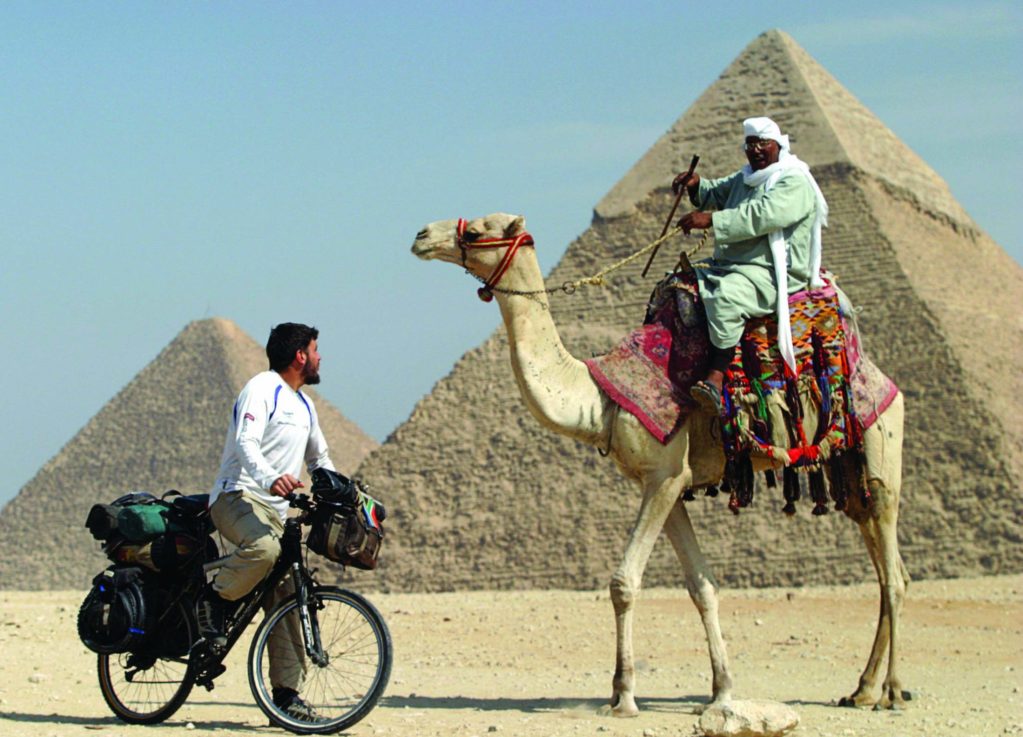Firms like to talk about investing in Africa. But what they are really looking at is a jumble of 54 sovereign countries, with their own laws, regulations, cultures and languages. Only a few people are knowledgeable about all the countries. Among them is Riaan Manser.
Forty-year-old Manser grew up in Richard’s Bay, on South Africa’s east coast, where he spent most of his childhood roaming the outdoors. He studied human resources because he wanted to work with people. Manser took a job with private healthcare provider Prime Cure in Cape Town, selling insurance.
“One Sunday afternoon, I realized I wasn’t completely happy. I did my job just to make money. I decided my life was going to be much more than that. I made the decision to change my life,” he says.
A year later, in 2003, Manser mounted his bicycle and went on a 26-month ride across Africa, peddling 37,000 kilometers through 34 countries. He got to know Africa and its people slowly, learning important lessons in life.
“When I left South Africa, I wasn’t very organized. I had zero visas in my passport. I had to negotiate everywhere I went. I would have to remain calm and negotiate in extremely stressful situations, when I was freaking out inside,” he says.
Loading...
With every country he explored, Manser came to understand different cultures and dynamics, over time he developed exceptional people skills. He gained wisdom that can only come with experience and, as he firmly believes, trial and error.
“I want people to understand that success comes from failure. We like to learn from other people’s mistakes very much, but the problem is that you normally don’t learn as astutely as you would if you learnt on your own. You’re generally most successful if you are willing to take a calculated risk.”
His insights have attracted the attention of numerous major multi-nationals from the mining, retail and financial services sectors, which Manser—who meanwhile also paddled 5,000 kilometers around politically unstable Madagascar and circumnavigated Iceland—now consults on how to expand into remote parts of Africa. Among them are mining giant Anglo American Platinum, heavy machinery manufacturer Bell Equipment, South African supermarket chain Shoprite and Zurich Bank International.
“I speak to CEOs but also to staff, who will be deployed to African countries, telling them what they can expect on the ground—be it regarding infrastructure, cultural issues, bribing or how to make business decisions in a foreign cultural context,” he says.
Manser, who remarkably never paid a single bribe during his adventures, says integrity, morality and patience are the keys to unlocking Africa’s potential.
“You must make [it] clear upfront that there is no room for negotiation about bribes. The most important thing is not to seem desperate. Desperation can be smelled a mile away. Even when I was panicking inside, I didn’t show one ounce of desperation,” he says.
Instead of paying kickbacks to smooth the rocky road of expansion, companies, especially those exploring natural resources, should focus on building good relationships with both national governments and local communities, suggests Manser.
“It’s vital that companies stop regarding Africa as a place where you can just take out resources. There has to be some giving… a generator for a village, digging a well. Communities don’t want to hear promises of better infrastructure five years down the line. They want to see improvements to their lives right away,” he says.
Manser knows how customs officials must be approached in Ghana compared to Angola, how to deal with government departments in Nigeria and how to open negotiations in Mauritania. Although his advice often seems almost obvious, at least in hindsight, it’s based on insights that can only be gained from having been there and having done it.
Patience, however, is key to commercial success in almost all African countries, says Manser.
“Don’t rush people. Don’t try to bulldoze them. The humility that comes through patience will lead to trust and ultimately to respect for each other. It’s the basis for building good relationships,” he says.
But the decision to be patient can’t be made in a boardroom. It’s something managers have to learn in a foreign context, on a day-to-day basis, says Manser.
Another key requirement for successful expansion is selecting the right people to do the job, Manser believes. In the small island nation of Madagascar, that has been experiencing years of political turmoil after a coup d’état in 2009, consolidation is seen as much more important than expansion.
“People just want stability. They want short discussions with firm results. So whoever negotiates on behalf of your company needs to know that,” he says.
In the end, it all comes down to good leadership: a lesson—and probably the most difficult one—Manser learnt when his travel partner Dan Skinstad, who has mild cerebral palsy, fell out of the boat when they circumnavigated Iceland in a two-man kayak, and almost drowned in the icy waters.
“You need clarity of thought in difficult situations. If there is a crisis, you have to make a decision with clarity, not in a panic. You take stock of what you promised, of what you want to achieve and then implement what is necessary to get you there,” says Manser.
Good leaders acknowledge other leaders. When Manser returned from Africa, former president Nelson Mandela was so impressed with his feat, he requested a meeting with him, saying Manser was an inspiration to the continent. Manser has made that his goal.
Loading...
